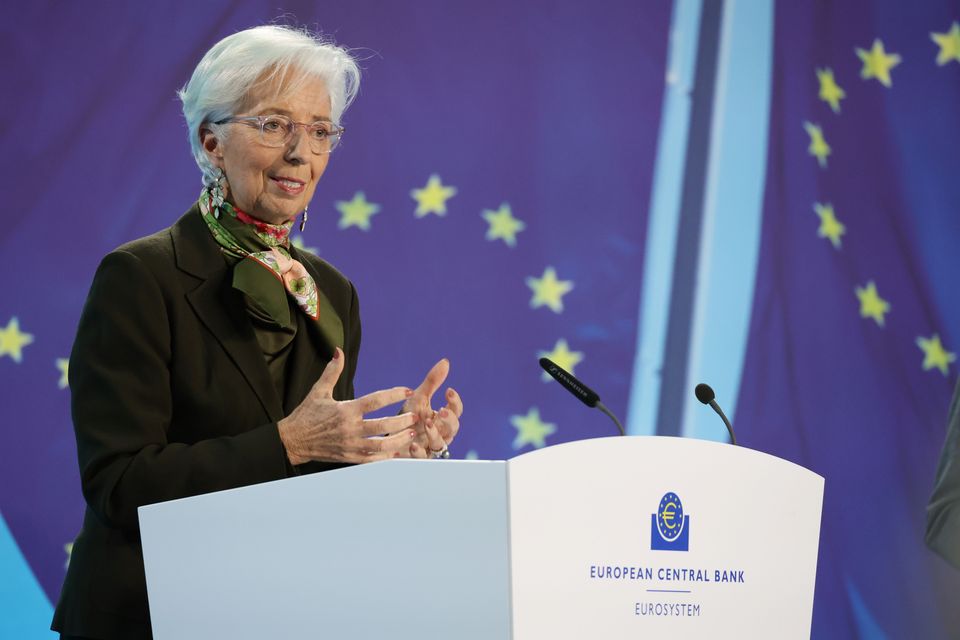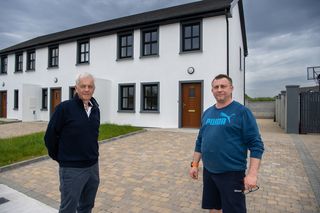Taoiseach says mortgage interest relief being considered, as fresh ECB rate hike sparks more pain for homeowners
The ECB President Christine Lagarde. Photo: Andreas Rentz/Getty Images — © Getty Images
Mortgage interest relief will be considered as part of Budget 2024 – but it is not promised, Taoiseach Leo Varadkar has said.
Cuts in income tax are more likely as well as bands and credits being indexed, according to Mr Varadkar.
His comments come as the Government comes under increased pressure to help mortgage holders facing spiralling hikes. Borrowers today were hit with a seventh interest rate rise.
“Any decision on reintroducing mortgage interest relief would have to be considered as part of the Budget in October,” he said.
“So, it is something that we will consider but I do need to be frank with people - the tax package can only be so big, we want to do something obviously to help workers who are paying an awful lot of income tax, particularly middle income people.
“We want to make sure that we honour that Programme of Government commitment to reduce income tax and to index bands and credits.
“After that, we can look at other things, for example, tax concessions for mortgage holders and landlords to encourage them to stay in the market.”
Mr Varadkar said the relief is “under consideration” but said he cannot promise that it will happen as part of Budget 2024.
The Taoiseach said it would be “nice” to put in place targeted measures for mortgage holders.
He said people with tracker mortgages were paying very low interest rates for very long periods of time and “are now in many cases paying interest that many people were paying for ages”.
“Doing something for one group mightn’t be fair,” he added.
European Central Bank
Earlier today, the European Central Bank (ECB) said it is pushing up its main lending rates by 0.25 percentage points.
The announcement takes its key refinancing rate, which mortgages are mostly priced off, to 3.75pc.
The move is set to put pressures on people hoping to buy a home, those coming off fixed rates, tracker mortgage holders and those on variables.
Although it is the seventh rate rise since last summer, there is some relief that the European central bankers did not impose a higher rise, as some had expected.
Every 0.25 percentage point in mortgage rates adds around €13 to the monthly repayments on each €100,000 borrowed over 25 years.
This means that if the full rise just announced by the ECB is passed on to home-loan borrowers it will add more than €150 a year to the cost of repayments for each €100,000 borrowed.
And the ECB could announce up to two more rises in its deposit and refinancing rates before the end of the summer.
The speed of the rate rises is unprecedented. Another two increases would mean the ECB will have imposed nine rate hikes.
Central bankers are trying to use rate increases to tame price rises.
Inflation in the eurozone picked up last month. It went from 6.9pc in March to 7pc last month.
Core inflation, which excludes volatile food and fuel prices, slowed to 7.3pc from 7.5pc.
Latest calculations indicate there are around 171,000 tracker mortgage holders in Ireland, which are directly impacted each time there is an ECB rates rise.
Trackers are set at a margin over the ECB rate, and rise and fall with the movement of the key ECB refinancing rate.
The latest hike will also push up the cost of new fixed rates for new home buyers.
However, the mainstream banks here have been slow to pass on the full rate rises announced by the ECB to new fixed rates and to those on variables.
Some 50,000 homeowners are set to come out of fixed rates in the next three years, with financial advisers telling them to break out of these arrangements early and re-fix before rates go even higher.
Around 60,000 mortgage holders are trapped with vulture funds.
They are not offered fixed rates, and are being charged variable rates as high as 8pc and 9pc, with each ECB rate rise being passed on to them.
Typical tracker interest rates have spiralled from just 1.15pc in June last year to 4.65pc on average at present.
There is around €133,000 still to pay on a typical tracker, as these loans were taken out years ago.
A 0.25 percentage point rise will mean €200 extra in annual cost of repayments on a typical tracker, according to calculations by Mark Coan of money guide Moneysherpa.ie. This is for a tracker with 11 years of repayments left.
He said the average tracker outstanding is €133,000, with around 11 years left to pay. There are 171,000 mortgage accounts still on a tracker rate. He based his calculations on Central Bank figures.
Some 210,000 mortgage accounts are thought to be on variable rates.





